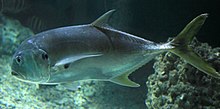Carangidae
| Carangidae | |
|---|---|

| |
| Crevalle jack, Caranx hippos | |
| Scientific classification | |
| Domain: | Eukaryota |
| Kingdom: | Animalia |
| Phylum: | Chordata |
| Class: | Actinopterygii |
| Order: | Carangiformes |
| Suborder: | Carangoidei |
| Family: | Carangidae Rafinesque, 1815 |
| Subfamilies | |
|
See text | |
The Carangidae are a family of ray-finned fish which includes the jacks, pompanos, jack mackerels, runners, and scads. It is the largest of the six families included within the order Carangiformes. Some authorities classify it as the only family within that order but molecular and anatomical studies indicate that there is a close relationship between this family and the five former Perciform families which make up the Carangiformes.[1]
They are marine fishes found in the Atlantic, Indian and Pacific Oceans. Most species are fast-swimming predatory fishes that hunt in the waters above reefs and in the open sea; some dig in the sea floor for invertebrates.[2]
The largest fish in the family, the greater amberjack, Seriola dumerili, grows up to 2 m in length; most fish in the family reach a maximum length of 25–100 cm.
The family contains many important commercial and game fish, notably the Pacific jack mackerel, Trachurus symmetricus, and the other jack mackerels in the genus Trachurus.[2]
Many genera have fairly extensive fossil records, particularly Caranx and Seriola, which extend into the early Paleogene (late Thanetian), and are known from whole and incomplete specimens, skeletal fragments, and otoliths. The several extinct genera include Archaeus, Pseudovomer, and Eastmanalepes.
Subfamilies and genera
The family Carangidae is subdivided into the following subfamilies and genera:[1][3]
- Subfamily Trachinotinae Gill, 1861[4]
- Genus Lichia Cuvier, 1816
- Genus Trachinotus Lacepède, 1801
- Subfamily Scomberoidinae Gill, 1890[4]
- Genus Oligoplites Gill, 1863
- Genus Parona C. Berg, 1895
- Genus Scomberoides Lacepède, 1801
- Subfamily Naucratinae Bleeker, 1859[4]
- Genus Campogramma Regan, 1903
- Genus Elagatis F.D. Bennett, 1840
- Genus Naucrates Rafinesque, 1810
- Genus Seriola Bleeker, 1854
- Genus Seriolina Wakiya, 1924
- Subfamily Caranginae Rafinesque, 1815[4]
- Genus Alectis Rafinesque, 1815
- Genus Alepes Swainson, 1839
- Genus Atropus Oken, 1817
- Genus Atule D.S. Jordan & E.K. Jordan, 1922
- Genus Carangoides Bleeker, 1851
- Genus Caranx Lacepède, 1801
- Genus Chloroscombrus Girard, 1858
- Genus Decapterus Bleeker, 1851
- Genus Gnathodon Bleeker, 1850
- Genus Hemicaranx Bleeker, 1862
- Genus Megalaspis Bleeker, 1851
- Genus Pantolabus Whitley, 1931
- Genus Parastromateus Bleeker, 1864
- Genus Pseudocaranx Bleeker, 1863
- Genus Selar Bleeker, 1851
- Genus Selaroides Bleeker, 1851
- Genus Selene Lacepède, 1802
- Genus Trachurus Rafinesque, 1810
- Genus Ulua D.S. Jordan & Snyder, 1908
- Genus Uraspis Bleeker, 1855
Timeline of genera

-
African pompano, Alectis ciliaris
-
Island trevally, Carangoides orthogrammus
-
Giant trevally, Caranx ignobilis, the largest species in the genus
-
Indian scad, Decapterus russelli
-
Golden trevally, Gnathanodon speciosus
-
Golden trevally
-
Pilotfish, Naucrates ductor
-
Lookdown, Selene vomer
-
Greater amberjack, Seriola dumerili
-
Japanese jack mackerel, Trachurus japonicus
References
- ^ a b J. S. Nelson; T. C. Grande; M. V. H. Wilson (2016). Fishes of the World (5th ed.). Wiley. pp. 380–387. ISBN 978-1-118-34233-6.
- ^ a b Froese, Rainer; Pauly, Daniel (eds.). "Family Carangidae". FishBase.
- ^ Eschmeyer, William N.; Fricke, Ron & van der Laan, Richard (eds.). "Genera in the family Carangidae". Catalog of Fishes. California Academy of Sciences. Retrieved 17 November 2019.
- ^ a b c d Richard van der Laan; William N. Eschmeyer; Ronald Fricke (2014). "Family-group names of Recent fishes". Zootaxa. 3882 (2): 001–230.
{{cite journal}}: Unknown parameter|last-author-amp=ignored (|name-list-style=suggested) (help)










